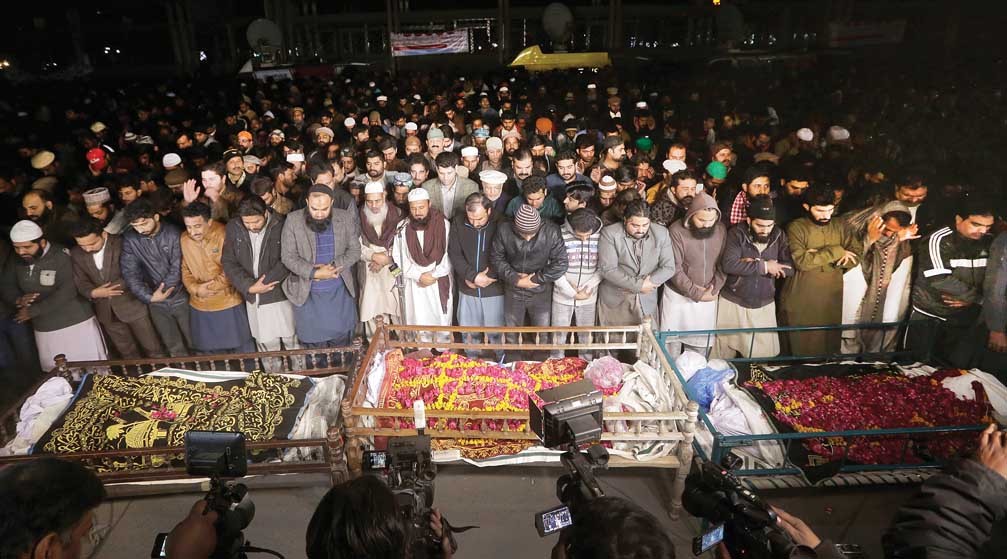
A chilling reminder that militarisation of counterterrorism remains a serious challenge in Pakistan

Following the killing of four people in a small car near Sahiwal, the Counter Terrorism Department (CTD) of Punjab police is in the limelight -- only to expose how it may be involved in the alleged extra-judicial killings and covering up such incidents by distorting facts. The media picked up the matter and did not let it fade before it was taken up by the government, courts and the parliament.
It soon came to the fore that three out of the four killed had no charge against them. The incident is largely being reported as one of a ‘fake encounter’. Meanwhile, the law enforcers while confessing to the three deaths as ‘blunder’ are insistent that Zeeshan Javed was a terrorist.
Soon after the incident, the CTD released an ambiguous and self-contradictory piece of information for the press, claiming that the dead were terrorists. The statement read: "The CTD staff stopped a car near Sahiwal toll plaza. The terrorists, after being asked to stop, started (indiscriminately) firing towards the officials. With the exchange of fire (from both sides) two women and two men in the car died (at the spot). These four people died because of firing from their aides. The operation was in continuation of the CTD operation on January 16. The CTD was already tracing the absconder terrorists -- Shahid Jabbar and Abdur Rehman -- from Faisalabad. Terrorists were travelling with a family to avoid police checking. As a result of firing, Shahid Jabbar and Abdur Rehman escaped. Suicide vests, hand grenades and rifles [no number of the weapons given] were recovered from terrorists."
Later, a viral video footage of the incident clearly showed there was no exchange of fire, and no weapons were recovered from the car. There was no sign of any aides of the killed family either, who were claimed to have escaped. The footage also showed the police directly and ruthlessly shooting the people in the car.
After Umair, the young injured son of Khalil, narrated the actual story, the issue gained unusual media attention, forcing the CTD to release another ambiguous and self-contradictory statement which read: "Zeeshan was an active member of Daesh. The car was being used in terrorist activities. Because of the tinted glasses of the car [which were not at all shown in viral, social media footage] the people sitting in the backseat could not be seen. The people in the car were killed by their aides on a motorbike. To secure Punjab from terrorism is not less than a miracle and is hard work of the CTD. A Joint Action Committee is investigating the incident and if there would be any wrongdoing/negligence on the part of a CTD official he would be taken to task."
It was in their third statement that the CTD admitted the family was not guilty but Zeeshan was a "terrorist" and "wanted" in many cases. This was followed by a preliminary finding of a Joint Interrogation Team (JIT) which also proved Khalil and his family innocent, and sought more time to investigate the matter of Zeeshan.
Family members of Zeeshan, however, insist he was a "true Muslim" and not a terrorist. "If he was a terrorist or had a criminal record, why was he not questioned or interrogated or nabbed earlier?," asks his mother.
The JIT, headed by a senior police official, has so far failed to reach any conclusion. It prefers to rely on earlier facts (that Khalil and his family were innocent and there should be further investigation on Zeeshan). It does not say anything about the manner of the killing which it was ideally supposed to do.
Dr Mehdi Hasan, Chairman HRCP, says, "Unfortunately, our law enforcement agencies are highly weaponised, and we see their misuse from time to time. The said incident raises serious questions on the credibility of law enforcement agencies and how they are labelling people as terrorists and killing them unlawfully."
"There should be a high-level judicial inquiry into the matter to expose truth and punish the culprits," he adds.
Also read: Operating with impunity
Fake encounters and extrajudicial killings have a long history. In another recent example, an inquiry report by a high-level official committee submitted before the superior court last week proves that Rao Anwar, a very influential and politically backed senior police official, killed Naqeebullah Mehsud and three others in a fake encounter and later made up charges of terrorism against them through fake reports in Karachi last January. Anwar is out on bail while families are still seeking justice amid fears and frustration.
Politician and human rights activist Afrasiab Khattak says that "militarisation of counterterrorism is a serious challenge in Pakistan and indicates impunity and lack of accountability of such law enforcement agencies". He urges the government(s) to investigate such cases in a transparent manner and set an example.